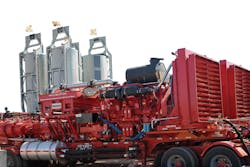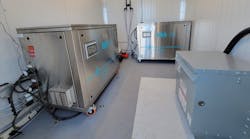With hydraulic fracturing operations set for renewed expansion in the U.S. as oil prices increase, the demand for freshwater will rise, as will the need to treat the volumes of produced and flowback wastewater. Centralized handling of water and wastewater is developing as an answer for long-term efficiency in managing water sourcing and wastewater treatment in hydraulic fracturing activities. The number of hydraulically fractured unconventional oil and gas wells in the U.S. and globally continues to escalate, though it slowed in 2014 when oil prices plunged.
The U.S. has wide-ranging reserves of hydrocarbons, which are commercially viable because of improvements in horizontal drilling and hydraulic fracturing technologies. As more unconventional wells are drilled and completed, the need for large amounts of surface water and groundwater withdrawals will rise.
Another concern is the wastewater generated from hydraulic fracturing that requires disposal or recycling. A substantial portion of the water injected into a wellhead during fracturing will come out of the well as flowback wastewater. This wastewater must be captured, treated, and disposed of or reused. Because water is the base fluid in hydraulic fracturing, it is vital in the operation and economics of unconventional oil and gas. But significant and developing water management objections impact the process.
Freshwater and wastewater procedures used for many years are experiencing stiffer governmental regulations because of water availability and disposal limitations. These factors caused oil and gas executives to reevaluate their water use and look for a long-range plan.
Outcomes
The centralized handling and reuse of effluent promises a truly all-inclusive approach to all aspects of freshwater and wastewater management in unconventional hydrocarbon output while optimizing the use of water resources throughout a well’s life cycle. Centralization provides the treatment and reuse of flowback wastewater from a number of wellheads when the wells are hydraulically fractured for the long-term, full life cycle of the wells. Furthermore, a consolidated system can more easily access and use alternative water sources, such as that from municipal wastewater facilities, which may be extremely difficult to access.
Inherently, wellheads providing unconventional oil and gas production are long-term processes, typically multiple-year terms, but conventional solutions for handling clean water resources and wastewater (flowback and produced water) are geared toward the short term. Impounding wastewater for evaporation in open ponds, trucking water over long distances to deep-well injection sites and treating flowback wastewater for reuse at the wellhead are all short-term options that do not address critical, long-term issues – such as depleting water sources, stricter regulations limiting wastewater disposal, and flourishing concerns over safety and the environment.
Centralized wastewater management is gathering momentum. In North America, centralized treatment facilities servicing unconventional oil and gas operations are up and operating or in development.
Dwindling water sourcing
Clean water supplies are more costly and harder to retrieve. Hydraulic fracturing operators can buy pond and well water from local property owners. Eventually, these property owners will run out of water. Water sourcing is the main hydraulic fracturing challenge. Hydraulic fracturing in arid regions can be hampered by the incessant threat of drought, and hydraulic fracturing operators compete with farmers and ranchers for their percentage of the available freshwater. In those communities, an indefinite supply of water for hydraulic fracturing does not exist.
Where water is more accessible, the number of good well sites increases, and sourcing becomes more difficult. Large water withdrawals from streams, rivers, privately owned lakes and ponds, or groundwater could affect the accessibility of nearby drinking water sources and other freshwater requirements, increasing potential disputes between water users.
Wastewater disposal constraints
Many well sites have specially lined surface ponds to store hydraulic fracturing flowback and produced wastewater for evaporation or until preparations are made for disposal or treatment.
Deep-well injection
In many U.S. regions, deep-well underground injection is popular for the disposal of hydraulic fracturing fluids and other substances from unconventional extraction. Some regulators, however, have outlawed this method.
Wastewater treatment
Some drilling operators elect to reuse part of the wastewater to replace and/or supplement freshwater. Reuse an of unconventional field’s wastewater, in part, depends on the levels and types of contaminants in the effluent and the proximity of other fracturing sites that might reuse the wastewater. This method can reduce discharges to surface ponds and the underground injection of effluent. It also conserves and reuses water resources.
Integrated water management
Centralized treatment of wastewater is a viable solution for long-term efficiency in managing water sourcing and wastewater treatment in hydraulic fracturing. Centralized treatment facilities are designed and constructed to handle flowback wastewater and produced water from oil and gas wells. Pipelines connect some wellheads directly to a central treatment plant if one is available. In some remote locations, the water is transported to the centralized location by a truck.
Demanding importance
The growth of an integrated infrastructure for water management in unconventional oil and gas production has lagged behind enhancements in drilling and completion technology.
In the face of increasingly circumscribed traditional water sourcing options and stiffened wastewater treatment governance, building up this infrastructure network to accommodate these water- and wastewater-related requirements is of demanding importance if oil and gas producers are to effectively manage their well operations and optimize their bottom lines.
Known in the industry as “Wastewater Dan,” Dan Theobald, proprietor of Environmental Services, is a professional wastewater and safety consultant/trainer. With more than 24 years of hands-on industry experience operating many wastewater treatment processing units, he is anxious to share his knowledge with others. Email the [email protected] with wastewater queries.


